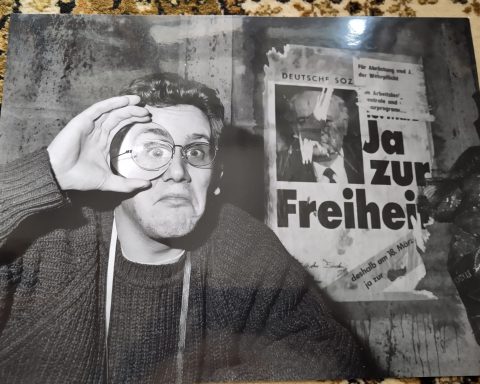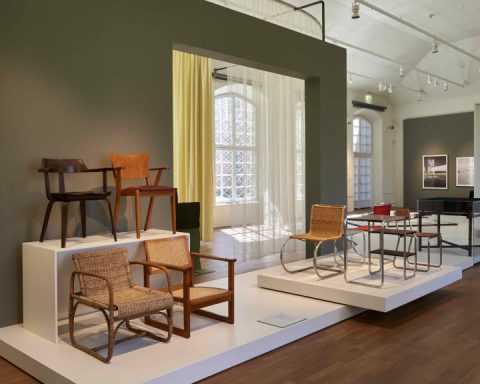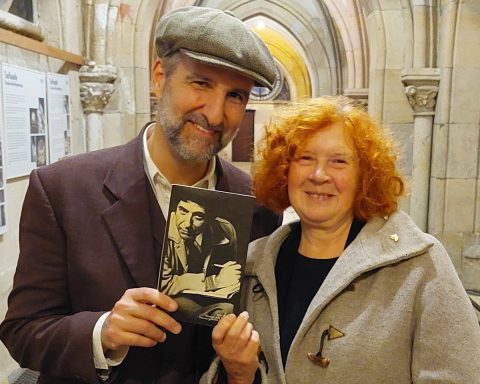
Editor’s note: The idea for this column, which debuted three Saturdays ago, is for people to share their transnational cultural experiences – a past and present involving personal relationships where our sense of belonging, country and background intersect with another, or multiple others, in deeply personal ways that imprint feelings and memories and shape us and change us in some important way. If you’d like to share your own story with us as a guest columnist, please write us at newswriterana@gmail.com.
A five-part series written by German novelist and Leipzig Writer member Diana Feuerbach has kicked off the column in style. In today’s “Thank you for your letter,” Diana talks about her life, shifting perceptions about Soviets and about America, and changing mode of communication with her Russian penpal surrounding the fall of the Soviet Union. The series will continue to run until next Saturday.
“Thank you for your letter,” Part IV: A Misunderstanding
By Diana Feuerbach
Yes, the soldiers did put the gate back. And we can’t say for sure it was them trying to break into the arbor. They never showed up again. On the contrary: One day, the entire Red Army packed up and left East Germany—the biggest troop contingency to have occupied a territory over such a long period of time. Most East Germans were happy about this side effect of the political Wende. My Dad was optimistic enough to believe that the Americans too would close their bases in West Germany and go home. His re-united Germany shouldn’t belong to any military alliance, but remain neutral and peaceful in the heart of Europe.

Before long, his hopes turned out to be utopian. But let me take another step back. During the last years of the GDR, I was sent once more on an emotional rollercoaster ride featuring our Russian Brothers in the East. As a child I had devoured the books by Alexander Volkov—he wrote a Russian version of The Wizard of Oz, teeming with splendid witches. Now I was reading the Kirghiz novelist Chingiz Aitmatov. His books made it clear to me once and for all that the CCCP was not uniformly made up of Russians but by over a hundred nationalities. His protagonists contradicted the literary pattern of Pavel Korchagin (the hero of a propaganda novel titled How the Steel was Tempered by Nikolai Ostrovsky, much hyped at school).
My sudden love affair with Aitmatov nearly made me flunk my German exam in tenth grade. “Heroes of Our Everyday Socialist Life“ was to be the topic of our written compositions. I wrote an essay about Aitmatov’s novel The Place of the Skull. The novel tells the story of a religious idealist and would-be priest who gets thrown out of seminary and becomes friends with drug smugglers. In the Kazakh steppe, he tries to stop the cruel slaughtering of wild antelopes, but ends up getting crucified by his foes.
The book also talks about wolves and Jesus Christ. Had I misunderstood the topic of the exam? The novel had not been part of the school curriculum, and Avidiy Kallistratov was a tragic hero at best. My German teacher, thank God a progressive thinker, had a hard time convincing his colleagues that my essay was valid. He managed to save me from flunking. But Aitmatov saved me even more. I never again thought in clichés about Russians and the many other peoples in the gigantic empire that was soon to crumble.
In 1990 the city of Karl-Marx-Stadt, named after a failed economist who, by the way, had never set foot in Saxony, was renamed back to the original Chemnitz by a three-quarters vote. The referendum for renaming Leningrad the following year was a much tighter race. Only a slim majority voted for the original name. From now on, I received mail from St. Petersburg. Simply magnificent. I read Alexei Tolstoy’s historical epic Peter the Great, learning that the tsar had had St. Petersburg built on the marshy grounds of the river Neva’s delta on the Baltic Sea as a ”Window to the West“. My penpal too leaned westward: she studied English and became a tour guide for foreign tourists. In her spare time she flew to Paris, sending me a picture taken on a merry-go-round from the Belle Époque: a dashing brunette with perfectly polished fingernails and crimson lipstick. Orange, it seemed, had gone out of style.
I embarked on my own journey. Curiosity lured me far away to America, the second superpower of the Cold War. My socialist education had made me believe they were the evil empire, not the USSR. I spent happy years in America, quickly overcoming my prejudices as well as my initial ignorance. The letters exchanged with Genia turned into emails. There were times when we heard little from one another. On one hand, we were just busy with our own lives. On the other hand, an email is no match for the beauty of a handwritten letter. As analog went digital, we didn’t oppose the zeitgeist. But something got lost which can best be described by the word magic.

Now and then, the media talked about Russia going through some very rough times. Gorbachev’s successor liked to have one too many, patting his secretaries’ butts even on camera. There it was again: the old laughing stock. Most Russians barely held on through years of predatory capitalism and inflation. But Genia had professional luck on her side—she guided American tourists through the Hermitage Museum and got paid in dollars.
The dollar remained my currency, too, until I gave up my apartment in Los Angeles and moved to London. It was the dawn of the new millennium, and one aspect of my decision proved right: I was once again closer to Russia. In the fall of 2001, the time had finally come for Genia and me to plan our first meeting. Genia had an Australian boyfriend in Oxford—definitely a post-Soviet chance at romance. As for me, the autumn of 2001 was no season for dreaming of marriage. London was shell-shocked in the wake of 9/11, leaving me unemployed. The only jobs I could land were in catering. In the week of Genia’s visit, I waitressed with a couple of Eastern Europeans at the German stand of the World Travel Market. I must have looked rather humble and needy then. When I strolled past the stand of Portugal on one of my breaks, the lady working there told me her country was definitely worth a visit, adding in a whispery tone, ”… and it’s cheap!“
(To be continued in Part V, next Saturday…)








![Wine & Paint event on 9 Nov. 2024 at Felix Restaurant, Leipzig. Photo: Florian Reime (@reime.visuals] / Wine & Paint Leipzig](https://leipglo.com/wp-content/uploads/2024/12/pixelcut-export-e1733056018933-480x384.jpeg)

